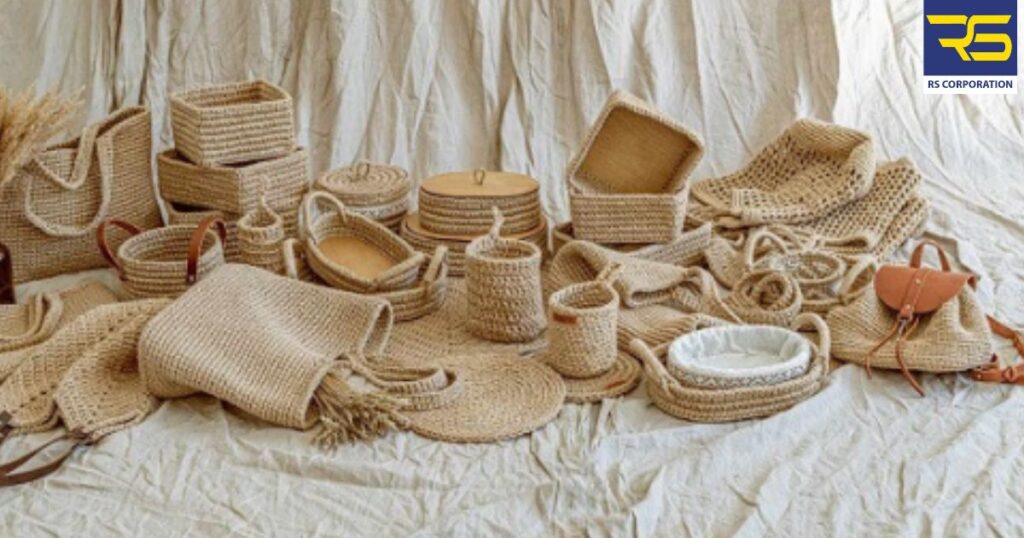Bangladesh is known for its jute industry, which is a significant component of its economy and has earned it the moniker “Golden Fiber” of the nation. A careful production process turns jute, a natural fabric with exceptional adaptability and environmental friendliness, into various items. We have different types of jute products in Bangladesh.We also make jute bag. Jute fiber bag are a sustainable and environmentally beneficial substitute for plastic bags. They also help to lessen plastic pollution.Jute bag are ideal for grocery shopping and carrying daily goods since they are robust, resilient, and can support large loads.
How is jute cultivated in Bangladesh
Jute the “golden fibre” contributes to Bangladesh’s industrial and agricultural sectors economy. Cultivating jute requires many complex procedures rooted in the nation’s agricultural past. Come with me as we explore Bangladesh’s intriguing jute farming history.Manufacturing processes are encouraged by jute mill, which create fresh and enhanced jute-based goods.
Selecting the Correct Soil
The first step in the procedure is choosing a suitable piece of land for jute sector cultivation. Regions such as the northern and central areas of Bangladesh are perfect for jute growth since they grow well in well-drained, fertile soil, especially in the floodplains of the Ganges Delta.
The preparation process
Farmers carefully plough and prepare the ground to ensure it is clear of weeds and rubbish. It is a critical step in creating an environment allowing jute seeds to sprout and develop.Jute bags are ideal for grocery shopping and carrying daily goods since they are robust, resilient, and can support large loads.
The process of selecting and sowing seeds
It involves choosing premium jute seeds to guarantee a robust harvest. The seeds are sown in rows, either by hand or with seed drills, usually in the monsoon season (March to May), since jute needs a lot of moisture to germinate and flourish.
Crop Maintenance
Farmers carefully tend to their crops once the seeds are placed, monitoring water levels and pulling weeds. Jute needs regular irrigation, especially during the dry season, to develop to its full potential.Jute bags are adaptable and available in a range of sizes and styles. They may be used for various activities, including shopping.
Pest and Disease Control
Jute is prone to pests and diseases, just like any other crop. Farmers use various approaches, such as natural predators, pesticides, and cultural practices, to efficiently manage pests and diseases while limiting their environmental impact.
Bangladesh’s agricultural legacy is firmly rooted in the labor-intensive yet rewarding process of jute farming. Every stage calls for meticulous attention to detail and knowledge accumulated over generations.
What are The key Factors Influencing Jute Cultivation
Like any agricultural venture, jute farming in Bangladesh is shaped by various factors that affect the crop’s sustainability and success.The biodegradable nature of jute fibers makes jute goods environmentally benign and supportive of sustainable practices.
Jute goods are solid and long-lasting, guaranteeing dependability and longevity in various applications, including home décor, textiles, and packaging.
Climate and Geography
Bangladesh benefits from a tropical monsoon climate with plenty of rainfall and high humidity, which is ideal for jute farming. Much of Bangladesh’s jute crop is produced in the Ganges Delta region, which provides nutrient-rich alluvial soil and sufficient moisture.
Soil Quality
Fertile, well-drained soil with a high ability to hold moisture is ideal for jute growth. The soil’s pH, texture, and nutritional content influence the crop’s quality and yield. Farmers frequently test the soil to determine whether it is suitable for growing jute. Fertilizer and other soil amendments are used as needed.
Water Supply and Irrigation
Water is essential to jute farming, particularly during germination, growth, and retting. Because jute goods breathe so well, they are perfect for agriculture, such as sacks for storing grains, fruits, and vegetables.
Variety and Seed Quality
Choosing the suitable types and premium jute seeds is essential to a good harvest. To optimize yield potential, disease resistance, and fibre quality, farmers prefer improved jute types to enhance productivity and profitability. Jute yarn is so breathable that it may be used to create pleasant textiles like bags, clothes, and home furniture. Jute yarn adaptability makes it simple to combine it with other fibers, such as cotton, wool, or synthetic materials, to improve its qualities. Jute yarn is highly absorbent and can make carpets and other absorbent textiles.
Management of Pests and Diseases
Jute crops are vulnerable to several pests, such as aphids, nematodes, and jute stem weevils, as well as fungi that cause leaf blight and stem rot.Bangladeshi jute is widely recognized for its exceptional quality and durability, making it perfect for various industrial uses, including textiles and packaging materials.
What are the primary sectors utilizing jute products in Bangladesh
With its adaptability, environmental friendliness, and many uses, jute is highly valued in various industries. Jute rope is widely sold in Bangladesh’s textile sector. Many textiles, such as sacks, bags, carpets, rugs, curtains, and upholstery fabrics, are made from processed jute fibres.Jute fiber regulates temperature effectively in carpets and upholstery.Jute fiber is so breathable it facilitates air circulation, which is helpful for clothing and household furnishings.
Packaging Industry
Because of its strength, flexibility, and biodegradability, jute has long been a preferred material for packaging. Rice, wheat, lentils, potatoes, and other agricultural goods are frequently packaged in jute bags in Bangladesh.
Agro-based Industries
In Bangladesh, jute is essential to supporting agro-based industries. Jute fibers make twines, ropes, nets, tarpaulins, and geotextiles used in construction, landscaping, gardening, fishing, and agriculture. West Bengal is well known for its rich cultural legacy, drawing tourists from all over the world with its varied dance, music, art, and literature repertoire.
What role does the government play in promoting the jute industry
The government of Bangladesh contributes significantly to the jute industry’s growth through several laws, programs, and other measures designed to encourage the industry’s expansion, viability, and competitiveness. Jute burlap is renewable and biodegradable, making it an eco-friendly material that may be used for a variety of purposes. Carpet backing cloth gives carpets more resilience and strength, extending their lifespan and toughness against abrasion.
Support for Policy
The government develops and executes policies to encourage jute production, processing, and export. Incentives like grants, subsidies, tax rebates, and tariff protection are frequently included in these policies to promote investment in jute-related businesses.Shopping bag save you time and effort by enabling you to carry your goods safely and comfortably, eliminating the need for multiple journeys to the store. As a supplier of jute, you help lower carbon emissions by encouraging a crop that grows with little help from chemicals and absorbs a lot of CO2.
Research and Development (R&D)
The government allocates funds for R&D projects to develop novel jute-based products, optimize processing technologies, improve jute fabric varieties, and improve agricultural techniques. Diversified jute product lessen the environmental impact of many businesses by providing a sustainable substitute for conventional materials.Jute twine is a highly sustainable and biodegradable material that reduces environmental effects, making Bangladeshi jute products exceptionally eco-friendly.
Infrastructure Development
The jute industry can only operate efficiently with infrastructure development. To facilitate the transfer of raw jute and jute products around the nation and for export, the government finances the building and upkeep of jute mills, processing facilities, storage warehouses, transportation networks, and port infrastructure. Adamjee Jute Mills, a significant producer of jute products, contributes significantly to the agricultural industry by giving jute farmers a market.Jute plant provides a sustainable and eco-friendly source of fibre, contributing to environmental conservation efforts. We are jute bag exporter. Jute exporter generate jobs in both rural and urban regions, which is a significant factor in the economic development of jute-producing nations. Jute is environmentally benign and biodegradable, and jute exporter are vital to advancing sustainable agriculture.
Finance Facilities
Access to reasonably priced finance is essential for jute farmers, business owners, and enterprises in the jute value chain. Promote jute farming, processing, and marketing activities. When storing and transporting product, plastic bag can help shield them from infection and moisture. Demand indicates how much goods and services consumers are willing and able to buy at different price points, which in turn drives economic activity.With enough room, a beach bag may hold everything you need for a day in the sun, such as snacks, sunscreen, towels, and sunglasses.
Market Promotion and Export Assistance
The government launches programs to encourage jute based product exports and domestic consumption. The Bangladesh Jute Mills Corporation is vital to the economy because it encourages jute growing and processing. Jute is a versatile and environmentally friendly material.Plastic bags are practical for carrying groceries because they are solid and lightweight, eliminating the need for numerous journeys. Local communities benefit from job possibilities provided by Janata Jute Mills, which promotes stability and economic prosperity.
Conclusion
Analyzing Bangladesh’s jute product production process highlights the interplay between innovation and tradition that shapes this vibrant sector. Jute is still telling the story of the country’s economic empowerment, resiliency, and sustainability from its modest beginnings in the fields to its global markets.Jute from East Bengal is widely recognized for its remarkable resilience and strength, rendering it perfect for extensive commercial and industrial uses.



